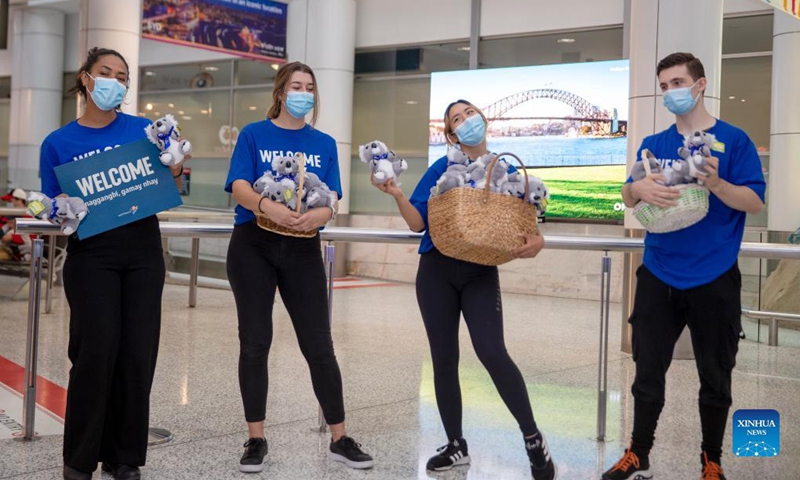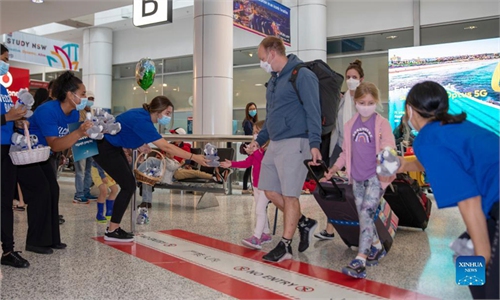
People welcome passengers from Singapore at Sydney Airport in Sydney, Australia, on Nov. 21, 2021. Australia's travel bubble with Singapore came into effect on Sunday.Photo: Xinhua
Australia reopened its borders to skilled workers and international students on Wednesday, nearly two years after closing them due to the COVID-19 pandemic, but a surge in the number of international students returning to the country is not expected given increasing concerns over the spread of the Omicron variant in many countries and regions across the world.
International students from China who have been fully inoculated with Sinovac and Sinopharm vaccines, which have been approved by the Australian Therapeutic Goods Administration, can enter the country from Wednesday without needing a travel exemption.
However, Omicron cases are surging overseas including in Australia, which has sparked anxiety among students.
World Health Organization chief Tedros Adhanom Ghebreyesus warned on Tuesday that the strain had been reported in 77 countries and had "probably" spread to most nations undetected "at a rate we have not seen with any previous variant," AFP reported.
It appears likely the variant will become the dominant strain in Australia as COVID-19 case numbers in New South Wales jumped again on Wednesday to 1,360, 25 of which were the Omicron variant, according to media reports. In Australia, to date, 109 officially confirmed cases of Omicron have been reported, the country's Department of Health said.
Some Chinese students reached by the Global Times on Wednesday said that they would wait and see how the pandemic develops in the coming days before deciding whether to go back to Australia, while some said they have already purchased flight tickets to Australia due to their academic arrangements.
Jane Zhang is one of the Chinese students to have purchased a ticket back to Melbourne on the first day of the border reopening. "I feared that there would be a change in Australian inbound policy if I returned to my university later. I have been stuck in China for nearly two years taking online courses just because I failed to return to Australia in time before the country shut its border," Zhang told the Global Times.
Although she is deeply worried about Omicron and the ineffective anti-epidemic measures taken by Australian authorities, she felt she had to go to Australia to finish her course.
Another Chinese student surnamed Li studying with the University of Sydney also arrived on Wednesday morning and started his three-day home quarantine.
The students both said there were many empty seats on the plane.
The Global Times learnt that several students who had planned to apply to study in Australia had chosen other study destinations. One said he decided to go to Hong Kong to do a master's degree and one said he would stay in China for the bachelor's degree and may go overseas for a master's degree in the future if necessary.
Australian newspaper The Age reported on Wednesday that a headlong rush through the arrivals gates in the coming days is unlikely, citing Qantas which reported no spike in arrivals booked for the coming days. Also, Melbourne backpacker hostels are reporting only small increases in inquiries and few reservations.
International education expert Peter Hurley from Victoria University's Mitchell Institute was quoted by the report as saying that there would be far fewer international students in Australia in 2022 than before the pandemic.
A Chinese public opinion poll on Australia conducted by the Global Times Research Center in June showed that people have a less favorable attitude toward Australia, and the mention rate of Australia on the list of top destinations for Chinese international students dropped 5 percentage points in 2021.


